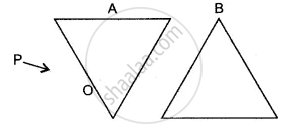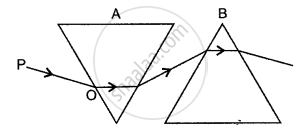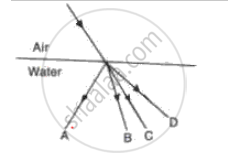Advertisements
Advertisements
प्रश्न
The figure shows two prisms A and B. A monochromatic ray of light PO is incident at the face of the prism A. Complete the diagram to show the path of the ray till it emerges out of the prism B.

उत्तर

APPEARS IN
संबंधित प्रश्न
A student very cautiously traces the path of a ray through a glass slab for different values of the angle of incidence (∠i). He then measures the corresponding values of the angle of refraction (∠r) and the angle of emergence (∠e) for every value of the angle of incidence. On analysing these measurements of angles, his conclusion would be
(A) ∠i > ∠r > ∠e
(B) ∠i = ∠e > ∠r
(C) ∠i < ∠r < ∠e
(D) ∠i = ∠e < ∠r
State the dependence of angle of deviation On the refractive index of the material of the prism.
A monochromatic ray of light passes from air to glass. The wavelength of light in air is λ, the speed of light in air is c and in glass is V. If the absolute refractive index of glass is 1.5, write down
- the relationship between c and V,
- the wavelength of light in glass.
When light travels from a rarer to a denser medium, its speed ______.
The critical angle for glass-air is 45° for the light of yellow colour. State whether it will be less than, equal to, or more than 45° for (i) ref light, (ii) blue light?
A ray of light passes from air to water. In fig. 39, which of the ray A, B, C and D is the correct refracted ray?

The critical angle for glass-air interface is :
Does the depth of a tank of water appear to change or remain the same when viewed normally from above?
Name two instruments of the total refracting prism in which is used.
